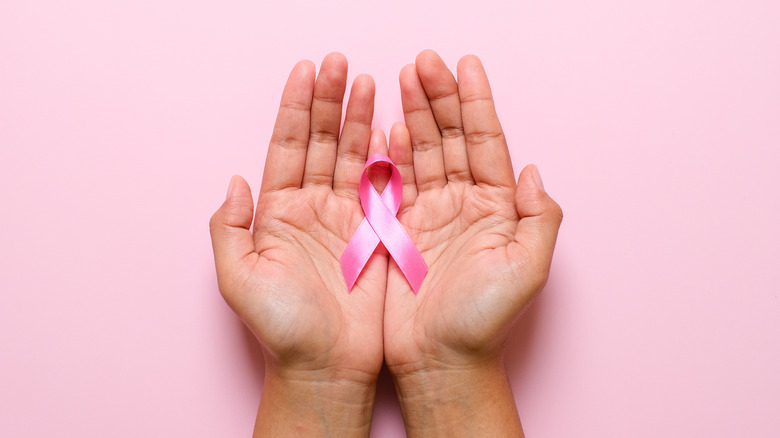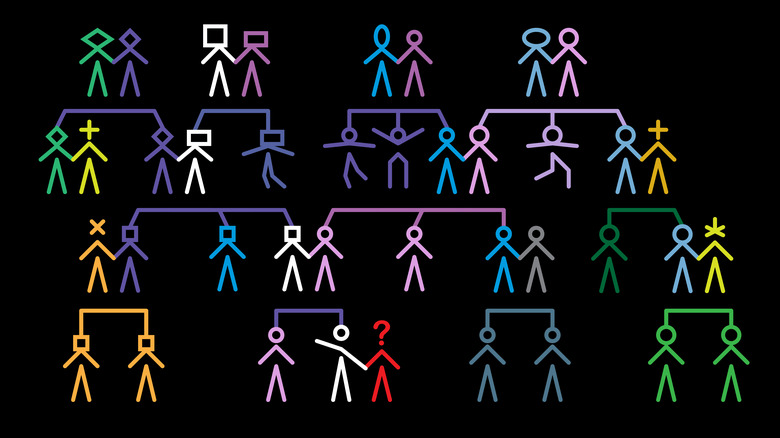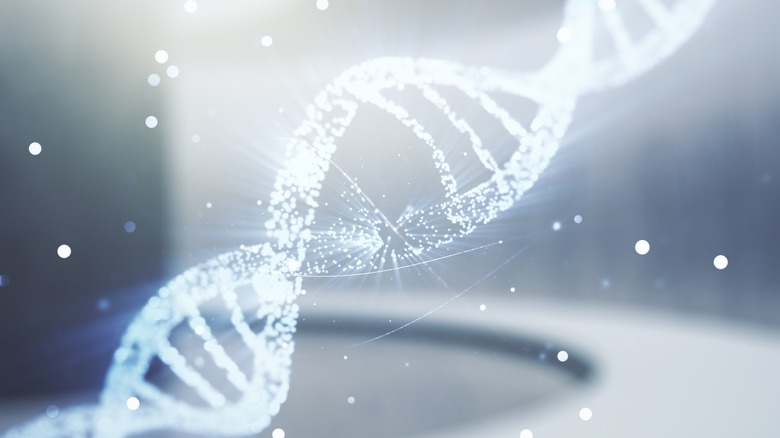What To Expect When Getting Genetic Testing For Breast Cancer
Breast cancer is the second most common cancer to affect women in America. Only skin cancer is more common (per the Mayo Clinic). While it most frequently affects women, breast cancer can also affect men. According to the Centers for Disease Control and Prevention (CDC), men account for 1% of breast cancer cases.
Breast cancer develops when cells in the breast start to divide more quickly than other cells and clump together to form a tumor. Some of these tumor cells may spread to other parts of the body, especially to the lymph nodes. Most breast cancers start in the milk ducts of the breast, but they can also start in the lobules of the breast or other tissues.
One symptom of breast cancer is the development of lumps or thickening of the breast tissue. If you conduct at-home manual breast exams, you are looking for these lumps or thickened tissue. Other symptoms include changes in the skin of the breast (such as dimpling, pitting, or redness), peeling, scaling, crusting, or flaking of the skin of the breast or nipple, newly inverted nipples, changes in the size or shape of the breast, and other changes in appearance. Make an appointment with your doctor if you notice any of these symptoms. But for some folks who have a family history of breast cancer or other individual risk factors, your doctor may recommend that you seek genetic testing to determine whether you have a known genetic cause of breast cancer and to assess your chances of developing breast cancer.
Genetic testing can assess your risk for many diseases
The cells of your body are constantly replicating and dividing. That's how we grow and also how we replace old, dying cells. Every time your cells replicate and divide, they copy your DNA, and sometimes your cells make a mistake. These mistakes are much like a typing error, and that error gets copied and passed on to all descendants of that cell.
All of us build up mutations over time, and most of the time they have no impact on our health. But when the mutation affects a tumor suppressor gene or an oncogene, it can lead to cancer (per Healthline). Both types of genes control cell division, and errors in these genes can cause cells to reproduce too quickly and not die when they should. You can develop mutations in these genes through the normal aging process, or you can inherit them from your parents.
According to the CDC, genetic testing looks for changes in your DNA known as mutations or gene variants. It can be used to diagnose many inherited medical conditions and can also assess your risk of developing many diseases. For some diseases, like Huntington's and cystic fibrosis, testing definitively shows whether you have or will develop the disease. For others, like breast cancer and Alzheimer's disease, testing simply shows your risk of developing it. Genetic testing can help you make decisions about your future, such as closely monitoring your health or taking preventative medical steps.
Expect to meet with a genetic counselor
If you choose to undergo genetic testing for breast cancer, you can expect to meet with a genetic counselor. According to the Cleveland Clinic, a genetic counselor is a healthcare professional who specializes in the genetic basis of disease and genetic testing. They work with patients to help them understand the types of tests available to them, whether they should get tested, and how to use the results of genetic testing to make medical decisions. Depending on where you go to see a genetic counselor, you may also meet with a medical geneticist or a surgical or medical oncologist (per a 2016 perspective from Frontiers in Surgery).
When you meet with a genetic counselor, they will ask about your family history and lifestyle. They will also ask why you are interested in genetic testing for breast cancer, then discuss the tests that are available. According to the CDC, there are three broad categories of genetic testing: single gene testing (which looks at just one gene), panel testing (which looks at several genes), and genomic testing (which looks at all your genes). Genetic testing for breast cancer is a type of panel testing that looks for changes in several genes that are related to breast cancer. Based on the results of panel testing, the genetic counselor can determine your personal risk for developing breast cancer, but cannot say for sure whether or not you will go on to develop it.
Expect to talk about why you are getting genetic testing for breast cancer
People explore genetic testing for breast cancer for a variety of reasons, so you can expect to talk about why you are interested in genetic testing when you go in for your appointment.
Some people come in for genetic testing because they have a family history of breast cancer or related cancers like ovarian cancer, according to a 2016 perspective published in the journal Frontiers in Surgery. Many women whose mothers or aunts went through breast cancer have a lingering fear about their own breast health and look into genetic testing for their peace of mind.
Others come in after being diagnosed with breast cancer, either before or after treatment. If you have been diagnosed with breast cancer, your doctor may recommend genetic testing. In either case, understanding the genetic source of your cancer may affect your treatment choices, including the decision as to whether you should undergo a prophylactic (preventative) mastectomy. Bring your medical records as well as any pathology reports you have to your appointment so that you and your medical team can consider your full health history as you make important medical decisions.
Expect to talk about the BRCA genes
You may have heard of the BRCA genes (pronounced "brack-uh"), the so-called breast cancer genes. BRCA1 and BRCA2 are two genes involved in your risk of developing breast cancer (per the National Breast Cancer Foundation). There are some common misconceptions about these genes, so it is important that you have an accurate understanding of them when you head in for genetic testing.
You might hear people say, "She has the gene for breast cancer," when referring to the BRCA genes, but that's not really correct. A gene is simply a stretch of DNA containing the information for making a protein. BRCA1 and BRCA2 are tumor suppressor genes, which means they tell your cells to make proteins that slow cell growth, regulate cell death, and aid with DNA repair (per Healthline). Everyone has BRCA1 and BRCA2 genes, including people who never develop breast cancer.
Genetic testing for the BRCA genes looks for mutations in these two genes. According to the National Breast Cancer Foundation, 1 in 400 people carry a mutation in one of these genes, and these mutations increase a person's breast cancer risk. About 60% of women with a BRCA1 mutation develop breast cancer before age 70, as do 45% of women with a BRCA2 mutation. Women with a BRCA mutation who successfully overcome breast cancer are more likely to have a recurrence of breast cancer. Even so, only 10% of all breast cancer patients carry a BRCA mutation.
Expect to talk about your family history
Family history plays a significant role in the risk of developing breast cancer, so you can expect to talk about yours before undergoing genetic testing for breast cancer. According to the CDC, women with a family history of breast cancer are more likely to develop it. Gather your family history before you meet with the genetic testing team. When you do, be sure to consider your father's side of the family, not just your mother's side. Sometimes, people only think of breast cancer risk as being passed from mother to daughter, but you can inherit risk from your father as well.
Talk to your family members about their history of breast cancer and ovarian cancer, which is related to breast cancer, but also about pancreatic cancer, metastatic or high grade prostate cancer, peritoneal cancer, and fallopian tube cancer (per the CDC). Record whether any of your relatives had breast cancer before age 50, in both breasts, triple negative breast cancer, and if any men in your family had breast cancer. Let your team know if anyone in your family has a known BRCA mutation or if your family has Ashkenazi or Eastern European Jewish ancestry, because BRCA mutations are more common in this ethnic group.
This is a lot of information to gather. The Office of the Surgeon General offers My Family Health Portrait, an online tool you can use to record and share your family history with your genetic testing team.
Expect to talk about your lifestyle
Family history and genetics are just part of the breast cancer story. Your lifestyle also plays a crucial role in your risk of developing breast cancer, so you can expect to talk about yours with your genetic testing team.
According to the American Cancer Society, there are several lifestyle factors that influence breast cancer risk. Some have to do with your diet and activity level: drinking alcohol, especially more than one drink per day, being overweight or obese, and not being physically active all increase breast cancer risk. Other risk factors relate to childbearing. Not having children, having a first child after age 30, not breastfeeding, and using oral contraceptives also increase the risk. The impact of other forms of birth control, such as shots, implants, intrauterine devices (IUDs), and vaginal rings, is not well understood yet.
Women who use hormone therapy to relieve the symptoms of menopause may also be at higher risk of developing breast cancer. Combined hormone therapy, which uses estrogen plus progesterone, after menopause increases a woman's risk of breast cancer after roughly four years of treatment. The risk goes down about five years after ceasing therapy. Estrogen therapy without progesterone does not seem to increase the risk of breast cancer but does increase the risk of stroke. If you are menopausal or have had a hysterectomy, talk to your doctor about the risks and benefits of hormone therapy.
Expect to talk about ovarian cancer
Ovarian cancer and breast cancer are linked, so you should expect to talk about ovarian cancer when you go in for breast cancer genetic testing. According to the American Cancer Society, women who have had breast cancer are at higher risk of developing ovarian cancer, especially if you have a family history of breast cancer. For some women, this increased risk is caused by hereditary breast and ovarian cancer syndrome (HBOC). HBOC is passed down through families and is caused by several mutations, including the BRCA1 and BRCA2 genes as well as other, less common mutations (per the CDC). Women with a BRCA1 mutation have a lifetime risk of ovarian cancer between 45% and 60%, and women with a BRCA2 mutation have a lifetime risk of between 11% and 35%.
Ovarian cancer affects the ovaries, two reproductive organs that release eggs and produce the hormones progesterone and estrogen (per the Mayo Clinic). Women with ovarian cancer may feel bloated, constipated, or tired, feel full quickly after eating, lose weight, experience back pain or abdominal discomfort, or they may experience no symptoms at all. Surgery and chemotherapy are two treatment options for ovarian cancer.
Expect to talk about the health implications of genetic testing
Genetic information can be powerful, but its power lies in what you do with it. Genetic testing for breast cancer reveals part of your personal risk level for developing breast cancer, but it does not definitively predict your medical future. People who are at high risk based on genetics may never develop cancer, while others with little genetic risk will. Your healthcare team can go over the options available to you in terms of monitoring your health or taking steps to prevent breast cancer.
According to a 2016 perspective published in the journal Frontiers in Surgery, women with a positive result from genetic testing for breast cancer may choose surveillance or preventative treatments such as chemoprevention or surgery. Patients who choose medical surveillance will undergo routine monitoring via mammograms, clinical examinations, and MRIs. Regular monitoring should detect breast cancer earlier when it is more likely to respond to treatment.
Genetic testing for breast cancer can also have implications for women who want to have children, because breast cancer treatment can affect fertility (per Komen). But there are steps you can take to preserve your fertility. For example, you may be able to choose a treatment approach that does not harm the ovaries, or you can store eggs to use in the future. Women who test positive for a BRCA mutation or HBOC may worry about passing these mutations onto their children. Talk to a fertility specialist about your concerns.
Expect to talk about preventative medication options
If genetic testing reveals that you are at high risk for breast cancer, talk to your doctor about medications that can reduce your risk. According to the National Cancer Institute (NCI), there are several medical treatments available that can reduce breast cancer risk, including selective estrogen receptor modulators (SERMs) and aromatase inhibitors and activators.
Breast cancer relies on estrogen, which normally supports reproductive health (per the Cleveland Clinic.) SERMs like tamoxifen and raloxifene block the effects of estrogen in certain tissues. Tamoxifen lowers the risk of certain types of breast cancer in pre- and post-menopausal women at high risk. It also prevents a recurrence of cancer after breast removal surgery. Raloxifene lowers breast cancer risk in post-menopausal women.
Aromatase inhibitors like anastrozole and letrozole and inactivators such as exemestane work by counteracting aromatase, an enzyme that the body uses to make estrogen (per the NCI). By blocking aromatase activity, these drugs reduce estrogen production. Aromatase inhibitors and inactivators prevent recurrence of breast cancer in patients who have survived it. Inhibitors also decrease the risk of breast cancer in women over age 60 who are at high risk or who have a history of mastectomy with ductal carcinoma in situ, a condition in which there are abnormal cells in the lining of a breast duct.
These medications can cause side effects including osteoporosis, fatigue, hot flashes, blood clots, and stroke. Along with your team, weigh the pros and cons of preventative treatment.
Expect to talk about preventative surgical options
Your doctor may present surgery as one option to reduce your risk of developing breast cancer based on the results of your genetic testing. Prophylactic mastectomy and ovarian ablation can both drastically reduce your risk of developing breast cancer or related cancers like ovarian cancer (per the NCI).
A prophylactic mastectomy is the surgical removal of one or both breasts, even when there are no signs of cancer. Women who have a high genetic risk for breast cancer may choose to have a bilateral mastectomy to remove both breasts, and women who have had breast cancer in one breast may choose to remove the other one. Ovarian ablation via oophorectomy reduces breast cancer risk because the ovaries produce estrogen, which many breast cancers rely on. Women whose genetic tests results put them at high risk, especially women with a BRCA1 or 2 mutation, may choose to undergo an oophorectomy or ablate their ovaries through radiation therapy or a targeted drug regimen.
Preventative surgeries can be comforting to many women, because the risk of breast cancer after is so low. However, these are major procedures with potentially major side effects. Removal of the ovaries causes symptoms of menopause such as hot flashes, difficulty sleeping, anxiety, depression, vaginal dryness, reduced sex drive, and loss of bone density (per the NCI). Removal of the breasts can cause pain, infection, swelling known as lymphedema, hard scar tissue, numbness, and shoulder pain and stiffness (per the Mayo Clinic).
Expect to talk about the privacy of your genetic information
As the number and types of genetic testing have increased, so have the number of questions surrounding genetic testing and information. Some people may be interested in getting genetic testing for their risk of breast cancer but also have concerns about how those results may haunt them in the future. Women may avoid genetic testing over fears that they will be denied health care coverage if they turn out to be at high risk for breast cancer.
According to the U.S. Department of Health and Human Services, the Genetic Information Nondiscrimination Act targets these valid fears by preventing discrimination based on genetic information. Under this act, healthcare plans cannot use genetic health information to determine eligibility, premiums, or any other activities related to the creation, renewal, or replacement of a health insurance contract or benefits. In addition, employers cannot discriminate against employees based on genetic health information.
This act does not apply to companies that sell life, disability, or long-term care insurance, which means that these companies can use genetic health information when deciding whether to underwrite a policy, according to the Genetic Literacy Project. If you are planning to undergo genetic testing for breast cancer, you may wish to take out a life insurance policy before going through with it.












